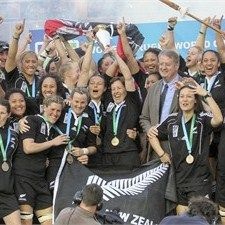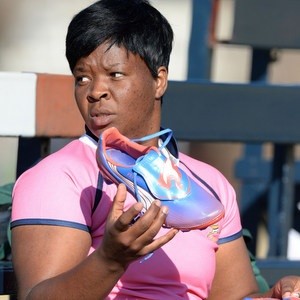
New Zealand celebrate a fourth consecutive WRWC title following victory over England in the 2010 final
With just over two weeks to go before Women’s Rugby World Cup 2014, we take a look back at how previous tournaments unfolded and at the Springbok squad and preparations.
Women’s rugby has experienced phenomenal growth in recent times and the number of women and girls playing the game currently stands at 1.5 million, a quarter of the overall total.
Much of that growth over the past five years has been driven by Olympic inclusion, the inception of the IRB Women’s Sevens World Series, Rugby World Cup Sevens and ongoing work between national unions and Olympic Committees.
However, many countries have deep roots in the women’s 15-a-side game, which has already seen seven world tournaments, four sanctioned by the IRB and three ‘unofficial World Cups’.
Here we provide a brief history of the Women’s Rugby World Cup movement.
1990 World Rugby Festival for Women
A tournament that featured hosts New Zealand, USA, Netherlands and Russia. New Zealand emerged winners, defeating the United States in the final.
1991 Women’s World Cup (non-sanctioned)
The first tournament referred to as a Women’s World Cup was hosted by Wales and featured 12 countries. England and USA booked their places in the inaugural final by shutting out France and New Zealand respectively, with the women from North America getting their hands on the silverware with a 19-6 victory. France and New Zealand shared third. Canada beat Spain 18–4 to take the Plate and fifth place.
1994 Women’s World Cup (non-sanctioned)
After the first tournament it was decided to move the event to the year before the men’s Rugby World Cup and the tournament was hosted in Scotland. Kazakhstan and Ireland were welcomed into the fold. England exacted revenge for their defeat at the hands of the Women’s Eagles three years earlier with a 38-23 victory in the final, while France beat Wales 27-0 to finish third.
1998 Women’s Rugby World Cup
The 1998 tournament was the first officially sanctioned by the IRB, played in Amsterdam, Netherlands. A record 16 teams competed, including New Zealand who had missed the previous event. The Black Ferns, led by inspirational skipper Farah Palmer, inflicted a record 134-6 defeat on tournament newcomers Germany and went on to beat USA 44-12 in the final to claim their first title. England took third with a 31-15 victory over Canada.
2002 Women’s Rugby World Cup
Spain hosted the 2002 tournament which saw New Zealand successfully defend their title. Once again the Black Ferns put a century of points on Germany as they eased their way through to the final at the Olympic Stadium in Barcelona. England were beaten19-9 in a match that produced some of the best rugby seen in women’s rugby up until that point. France overcame Canada 41-7 to claim third. Samoa enjoyed a dream debut on the WRWC stage with a 22-0 win over Ireland in their first ever match.
2006 Women’s Rugby World Cup
The 2006 tournament was hosted in Edmonton, Canada, the first major international rugby union tournament – and Women’s World Cup – held in North America. New Zealand defeated England in the final 25-17 to win their third successive title and France again beat Canada to third place with a 17-8 win. South Africa became the first African nation to compete in the tournament.
2010 Women’s Rugby World Cup
In 2008 four countries expressed interest in hosting the 2010 tournament and, after considering bids from the Rugby Football Union, the German Rugby Federation, the Kazakhstan Rugby Union and South African Rugby Union, the IRB awarded the tournament to England. Following the opening rounds played at the Surrey Sports Park, the final was played at a packed Twickenham Stoop, home to Harlequins, where New Zealand again triumphed against England, this time 13-10, to deny the hosts and claim their fourth successive title.

Springbok Rugby Women’s captain Mandisa Williams
The Springbok Women began finalising their preparations for the IRB Women’s Rugby World Cup on Monday as the squad assembled in Cape Town for their World Cup holding camp. The World Cup tour has been made possible by a R2,3m grant by the National Lottery Distribution Trust Fund.
All 26 players named in the Rugby World Cup squad reported for duty on Monday including Springbok Women’s captain Mandisa Williams, who was withdrawn from the warm-up tour due to a knee injury, as well as centres Marithy Pienaar and Ziyanda Tywaleni, who missed the tour due to knee and hamstring injuries respectively.
The World Cup will be hosted in Marcoussis, outside of Paris, from August 1 to 17, with the Springbok Women set to face Australia, France and Wales in the pool stages.
Springbok Women’s coach Lawrence Sephaka was pleased to welcome back his players for their final training camp and said: “It is good to have the team back together and it is pleasing to see the players fresh and ready for the big challenge that lies ahead.
“It is also satisfying to welcome Marithy and Ziyanda to the squad following their injury layoffs. The team realises that this is the last chance to work on the big things before the World Cup and they are all in the right frame of mind to achieve this.”
Sephaka said one of their main goals in the next two weeks before the team departs for France is to work on the areas of their game that let them down against the Nomads and France.
“We took several positives from our warm-up tour, particularly our defence and ability to score tries against the Nomads, and our encouraging performance all around in the second half against France,” said Sephaka.
“But there are areas we have to work on, which includes converting the pressure on attack into points and improving our scrummaging, so we have hard work ahead in the next two weeks.”
The team will have their World Cup capping ceremony and send-off function on the eve of their departure on July 26.
Springbok Women’s squad (alphabetical order):
Forwards: Celeste Adonis (Western Province), Nolusindiso Booi (Border), Nomathamsanqa Faleni (Eastern Province), Rachelle Geldenhuys (Blue Bulls), Portia Jonga (Eastern Province), Cebisa Kula (Eastern Province), Thantaswa Macingwana (Border), Lamla Momoti (Border), Nwabisa Ngxatu (Border), Asithandile Ntoyanto (Border), Vuyolwethu Vazi (Blue Bulls), Denita Wentzel (Western Province), Shona-Leah Weston (Blue Bulls), Mandisa Williams (Captain -Border).
Backs: Siviwe Basweni (Border), Lorinda Brown (Eastern Province), Cindy Cant (Blue Bulls), Phumeza Gadu (Eastern Province), Veroeshka Grain (Western Province), Zenay Jordaan (Border), Tayla Kinsey (KwaZulu-Natal), Benele Makwezela (Western Province), Fundiswa Plaatjie (Border), Marithy Pienaar (Blue Bulls), Siphosethu Tshingana (Eastern Province), Ziyanda Tywaleni (Border).
Springbok Women’s 2014 Women’s Rugby World Cup pool fixtures:
Friday 1 August, 15:45: Springbok Women v Australia – Marcoussis
Tuesday 5 August, 20:45: Springbok Women v France – Marcoussis
Saturday 9 August, 17:00: Springbok Women v Wales – Marcoussis
Ai toggie, sterkte Lawrence!
Wonder hoe sal die klomp Bafanny Bafanny HIERDIE keer vaar…ek hou nie juis asem op na wat ek laas van hulle gesien het nie… hulle het meer gelyk na n groep van “weight watchers international” as n rugbyspan.
@ Pietman:

Ha ha ha
Bafanny Bafanny
Users Online
Total 245 users including 0 member, 245 guests, 0 bot online
Most users ever online were 3735, on 31 August 2022 @ 6:23 pm